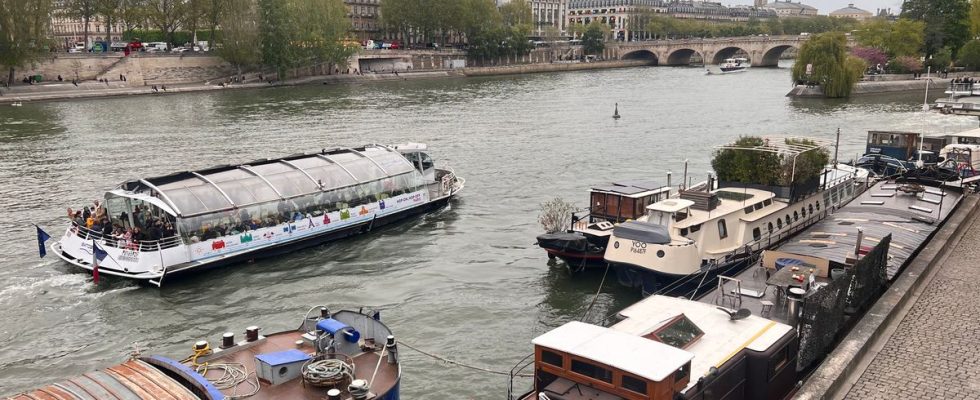Thirteen years after the unfortunate experience of Voguéo, a cooperative hopes to relaunch a river shuttle service on the Seine for the Olympic Games next year. This private initiative would be aimed at both tourists and commuters wanting to recover an RER.
“It’s quite absurd not to have river public transport in Ile-de-France”, laments Dany Carvalho. This naval officer, whom the confinement linked to the Covid-19 pandemic brought back to earth, took it into his head to resurrect the water coaches, many of which were in the region a century ago. He envisages a whole network serving twenty stopovers on the Seine and the Marne, nicely baptized “MonBeauBateau” (or “Mon BB” for short).
“By using ecological boats, we aim to complement existing public transport services”, explains to AFP the young CEO of RiverCat, a cooperative society created for the occasion.
First stage: a line crossing all of Paris, which would be launched in the spring of 2024 between Issy-les-Moulineaux (Hauts-de-Seine) and Alfortville (Val-de-Marne). The trip would take an hour and a half from end to end, at 12 km/h in the capital and 20 km/h in the suburbs, with stops at Beaugrenelle, the Invalides, the Louvre and the François-Mitterrand Library, every half-hour. hours from 6 a.m. to 10 p.m.
Six 100-seat catamarans each initially
The inspiration comes from London and Rotterdam, and these are six conventional 100-seater catamarans, using biofuels based on vegetable oils, which must be rented in the Netherlands, before the construction of electric ships, hopes Dany Carvalho. He spoke with the port of Paris “to have a temporary occupation agreement for stopovers”. Haropa Port, which manages said port, confirms having received a request at the end of April.
RiverCat is counting on tickets costing between 3 and 8 euros depending on the route, with books, subscriptions and discounts for Pass Navigo holders. This “Parisian line” is not part of the transport plans for the Olympic Games, but RiverCat is obviously counting on the event to impose it.
Avoid traffic jams
Another much shorter link, also on the Seine, must be tested in Essonne, during the Olympic Games, from July 25 to September 9, 2024. It must connect Soisy-sur-Seine every quarter hour to Ris-Orangis and Juvisy -sur-Orge, to reach a strategic station where two RER lines pass.
“It will be possible to cross the Seine (…) without emitting CO2 and above all without having to bear the constraints of traffic jams” particularly dense in this sector, greeted the mayor of Juvisy, Lamia Bensarsa Reda, quoted in the municipal newspaper.
Four small, futuristic boats will be rented from the Norwegian company Hyke, which will take charge of “the whole package” according to its general manager Bjorn Utgard: “The all-electric boats, the docks with integrated charging stations and the autonomy that will allow boats to navigate on their own. »
“If success is at the rendezvous”
A first boat of the same model must be launched in June, in Norway, specifies the official with AFP, adding that several cities are interested, including in France. “For too long, water has been neglected as an urban transport infrastructure and blue lung in a city,” he points out.
These 50-seat shuttles will first be piloted by a human, before operating in total autonomy. The project is also supported by Voies navigables de France (VNF), which was looking for demonstrators of carbon-free autonomous boats for the Olympic Games.
This link in Essonne is set to be made permanent “if it is successful”. A “promenade line” is also planned for the weekend, to the center of Paris.
A line on the Ourcq canal under study
“We are not asking for subsidies. We have an economic model which is based on the Parisian line and which allows us to be profitable during the fourth year of service” thanks to the 70% of tourists expected, affirms Dany Carvalho. He specifies that he is “in the process of raising funds for 3 million euros”, a sum according to him necessary “to start the service”.
Ile-de-France Mobilités, which has multiplied studies in recent years, remains doubtful. The last experiment, the Voguéo river shuttle to the south-east of Paris, was abandoned after three years in 2011, because it was not very busy and very expensive.
The regional transport authority is studying a line on the Ourcq canal, between Jaurès (north-east of Paris) and Bondy (Seine-Saint-Denis).

